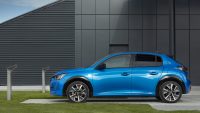No-one would dispute the claim 2020 has been a challenging year for everyone in the car industry, but in a time of crisis came new trends – and there are reasons to feel positive about 2021.
That’s the view of Auto Trader’s commercial director Ian Plummer and head of strategy and insights, Tor Lever, who appeared on Car Dealer Live.
In our exclusive video, which you can watch above, the pair joined James Batchelor to discuss why 2020 revealed some interesting trends in the new and used car markets, what dealers can learn from the past 12 months and why there’s an air of positivity about 2021 despite some key challenges on the horizon.
In summary, they discussed:
Car ownership isn’t dead
Auto Trader quizzed 1,500 people in November and 30 per cent of them believed owning a car had become more important in the light of Covid-19 – that was four percentage points up on July.
November also showed 74 per cent of people are more concerned about personal space, 84 per cent want exclusive access to a car within a household, 61 per cent want to own a car because it gives them a sense of freedom, while 45 per cent want to own a car because they enjoy driving.
Auto Trader data also shows the percentage of new groups of people looking to buy a car was up 15 per cent year-on-year in November, and the percentage of Auto Trader’s audience aged between 18 and 24 was up by 150 per cent year-on-year.
‘This year has seen a growing interest in car ownership and the desire to buy a new or used car. This is partly affected by a growing sense of wanting personal space, and we can see our audience are using that as a key driver for car ownership,’ said Plummer. ‘There’s also evidence that people enjoy driving and enjoy owning a car – especially millennials.’
Acceleration in digital
An Auto Trader poll of 1,500 buyers – as reported by Car Dealer – published in November showed the number of buyers prepared to complete their car purchase purely online is now 41 per cent, four percentage points higher than a year ago.
This rises to 61 per cent when these buyers are presented with the concept of a pure online sale – from clicking to order to getting it delivered.
‘Buying online is here to stay,’ said Lever. ‘This hasn’t just been the case in automotive but across all retail industries this year. Interestingly, looking at the demographics, it’s older people and those not so disposed to buying online in the past who have really moved forwards.
‘A number of new players are entering the space and really pushing their digital retail offering, and consumers are becoming very educated on what’s possible. We would guess if we run the same poll in a year’s time we’ll see that level of interest jump again.’
Dealers sold more efficiently
‘There are some key learnings retailers can take fro 2020,’ said Plummer. ‘You can see the enormous progress dealers have made, especially in the last lockdown in November where they were enormously resilient.
‘Our estimates for the used car sales retailers saw in November were around 23-25 per cent back on prior year. If you look back to the first lockdown, if a retailer had done 23 or 25 per cent of prior year, not 23 or 25 per cent back, they would have been delighted. That shows progression has really happened and retailers have engaged with this expectation from consumers of having more digital, but equally they’ve added in their own personality, the need to blend that physical and the digital touch points so that the consumer really gets the seamless journey they’re looking for.
‘Not everybody right now or even in the future is going to buy their car fully online, but we do see in our research that more than 30 per cent of people say they’re going to do more online today than they previously did. However, they still want to the touch points with the retailer, particularly around the emotional side.
‘Dealers have sold very effectively during the months in between lockdowns, the market was roughly three and a half per cent up on an average basis over those five months, and they did that very often with fewer sales people – around 80 per cent, on average, were at work.
So, with 80 per cent of their staff dealers sold slightly more cars, and they did that because they were really able to embrace digital, give the consumer what they wanted but also deliver on efficiency and retain more margin on slightly better sales. This is very positive science to take forwards.’
Trust is more important than ever
‘To echo Ian’s point, the number of people who are going to be buying a car completely remotely or online with no support from a real person is going to be quite small for a long time to come – the trust element is critical,’ said Lever.
‘The role and the way in which consumers can go through that process and can get that support is really changing. One of the really interesting things that came out of our research this year was just over 70 per cent of consumers said they still did want that human support and human touch-points, but actually about 40 per cent of them were willing to have it remotely.’
Lever added: ‘It’s the way the retailer can build trust with the consumer that has evolved, and we’re seen how retailers are embracing different ways of engaging with their customer base.’
2021 outlook
The pair also discussed…
- Demand in early 2021 looks to be positive
- Brexit and the effect on the new and used car markets
- New electric models coming to the market likely to spur demand
- New players like Carzam and Cazoo buying Drover driving positive interest into car buying
- Agency modelling
Click the video at the top of this story for the full interview
- Register as a Car Dealer member and get more out of the website here
- Car Dealer Top 100 – the most profitable car dealers in the UK here
- Car Dealer Mag issue 154 is out now – Read it here
- Join our breaking news WhatsApp group – Click here to join now

































